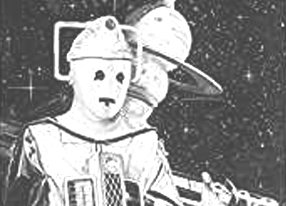The Wheel in Space
“These Cybermen of yours can’t just walk into the Wheel you know.” – Gemma
“They will find a way.” – The Doctor
 This story has to have the least amount of plot stretched out over six episodes of any Doctor Who serial ever. In the entire first episode, almost nothing happens save the Doctor and Jamie arriving in an abandoned ship and wondering where the crew has gone. [One odd aspect of this start-up episode (which seems designed to do nothing else but take up time) is how the Doctor references to a long list of elements in the TARDIS that have not been mentioned since the era of the First Doctor: the fault locater, the mercury-filled fluid link, the warning system using pictures to convey a message.]
This story has to have the least amount of plot stretched out over six episodes of any Doctor Who serial ever. In the entire first episode, almost nothing happens save the Doctor and Jamie arriving in an abandoned ship and wondering where the crew has gone. [One odd aspect of this start-up episode (which seems designed to do nothing else but take up time) is how the Doctor references to a long list of elements in the TARDIS that have not been mentioned since the era of the First Doctor: the fault locater, the mercury-filled fluid link, the warning system using pictures to convey a message.]
The second episode is equally slow with the crew of the space wheel largely talking amongst themselves and the Doctor absent altogether. By the third episode, we finally see some plot start to emerge. The Cybermen are arriving and arranging events to either sabotage or invade the station to unknown end. (The non-humanoid Cybercontrol makes its first appearance here directing the operation.) The Cybermats are finally shown to have a useful purpose, invading the stores of bernalium rods like scurrying mice in order to corrode and destroy them. They even get to gather in menace around one of the crew members but it’s unfortunately undercut by some horrible physical acting by the person under attack.
The pacing and editing are a bit off for most of the rest of the episodes—the otherwise skeptical crew panics about the Cybermen before having seen even a little evidence of them being there for instance. It’s really only in the sixth episode that the pace picks up and the Doctor starts to have a plan coming together with a cleverly rigged trap in his face-off of the Cybermen. He also gives a great description of them: “Their entire body are mechanical and their brains have been treated neurosurgically to remove all human emotion. All sense of pain. They’re ruthless inhuman killers!” Unfortunately, the resolution of the supposed big invasion is all crammed into the last few minutes of the show and thus does not have much dramatic impact. One of the low points of Troughton stories.
It is a little interesting that the writers try to paint a different picture of future Earth by having parapsychology and ESP stand on equal footing with engineering and technology. Judging mental strain and the standardized use of neurotropic drugs are the norm. Even the second in command of the station is a practicing parapsychologist. While most of the other characters are forgettable, Anne Ridler does a nice job here portraying the steely but entirely likeable Dr. Gemma Cowryn. One of the best scenes of the story is her coming on the intercom to make a warning, knowing full well that she’ll be killed once discovered, and she coolly and dispassionately warns the Doctor as a Cyberman looms over her shoulder.
We are also introduced to Zoe and there are several interesting aspects to her character from the start. Her eidetic memory and brilliant mind are highlighted but it is also shown to be a hindrance to her social skills; she’s considered heartless and robotic as she rattles off obscure statistics. (The Doctor gets to chide her a bit with the famous line “Logic, my dear Zoe, merely enables one to be wrong with authority.”) I had not picked up before that far from having a natural ability, Zoe is actually a product—one of many in her generation put through ‘parapsychological’ training from childhood who grow to be nothing but automatons but her perky personality somehow breaks through. (“My head has been pumped full of facts and figures which I reel out automatically when needed, but I want to feel things as well.”) But the story really misses a trick by not bringing this full circle and letting her have a significant emotional scene at discovering her mentor Dr. Corwyn dead. It would have been a touching and very moving moment.
Best unsettling moment:
Other than Dr. Gemma Coryn’s death, one particularly off-putting moment comes when Chang is trapped between a Cyberman and two of his cyber-controlled crewmates. His plaintive “Help me!” to them before being shot down is sad. What’s especially unsettling, however, is the next scene when in the course of conversation one of the crew notes with mild surprise that ship incinerator had been activated. Cleverly, no specific connection is made of this mention to the previous scene but the obvious tie is quite gruesome.
Firsts:
• Cyber-controller Machine
• Use of the alias Dr. John Smith (Invented by Jamie—and by simply seeing it written on a box label no less!)
Regrets:
I always find the modulations of the voices of the early Cybermen to make understanding them difficult. This is especially true of the Cybercontroller here—there are entire stretches of dialogue where I can’t understand what it’s saying.
